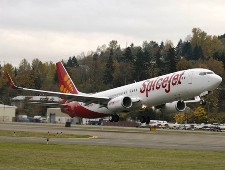 After establishing itself as an efficient low-cost carrier, SpiceJet has finally reported a profitable year. Revenues grew 29 per cent to Rs 2,181 crore (Rs 21.81 billion).
After establishing itself as an efficient low-cost carrier, SpiceJet has finally reported a profitable year. Revenues grew 29 per cent to Rs 2,181 crore (Rs 21.81 billion).
Lower fuel costs and tight control on expenses propped up earnings before interest, tax, depreciation and amortisation (Ebitda) margins to one per cent.
The airline was earlier losing around Rs 25 per Rs 100 revenue.
It reported a net profit of Rs 61.45 crore (Rs 614.5 million) compared to the steep loss of nearly Rs 334 crore (Rs 3.34 billion) in 2008-09. Operationally, the company maintained a load factor of 80 per cent.
While most parameters, like average seat kilometres flown, passengers carried, departures and revenue per available seat kilometre, improved, others softened.
A rise in operating leverage, an increase in operational revenues and higher load factor drove up profits.
Rationalisation of capacity increases and matching of demand and supply numbers enabled the company, which always had an enviable load factor, get into the black.
The euphoria in the airline industry has faded and given way to rational capacity build-up. After 18 per cent growth in passenger traffic from 2001 to 2008, there was a drive by airlines to increase capacity by nearly two times.
The subsequent recession, which saw an 11 per cent decline in traffic was a lesson for the airline industry to consolidate and rationalise.
With matters looking bright, Spicejet is expected to maintain a load factor of 77 per cent, much better than its rivals in the domestic sector. This will help generate enough cash reserves to expand.
Analysts reckon that even in the worst case scenario of a 50 per cent load factor, the company will have enough cash to sustain operations for 14 months without diluting equity. This resulted in ASK to rise from 35,000 million to 60,590 million in 2008.








